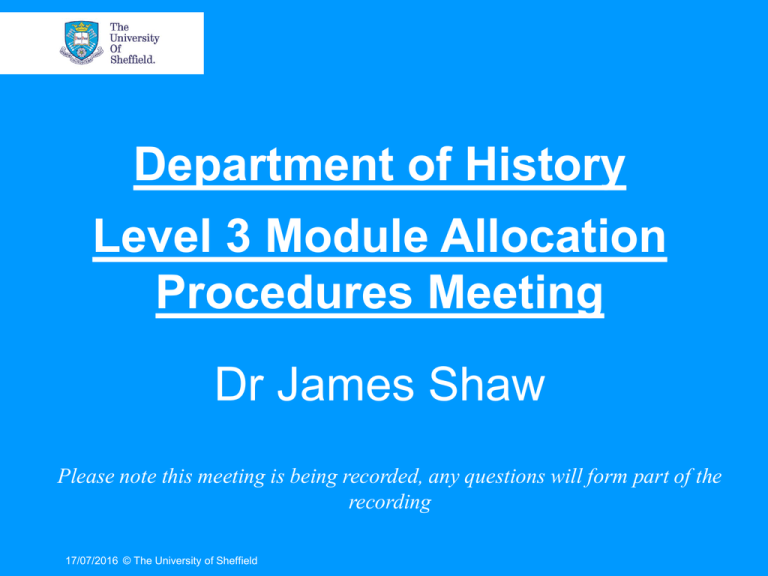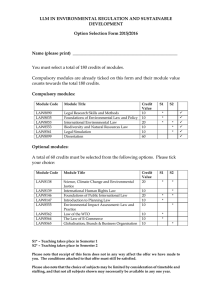Department of History Level 3 Module Allocation Procedures Meeting Dr James Shaw
advertisement

Department of History Level 3 Module Allocation Procedures Meeting Dr James Shaw Please note this meeting is being recorded, any questions will form part of the recording 17/07/2016 © The University of Sheffield Why do we do Module Allocations? • To allow student choice. • To ensure a fair allocations process. • For small group teaching – seminar groups of 16. • Last year every student who submitted on time was allocated to one of their top three special subjects. • Special Subjects get oversubscribed so please think carefully about all six of your preferences. • The module list will be different to the 2015-16 list. • The timetable is draft and is subject to change. 17/07/2016 © The University of Sheffield Module Allocations: the process Wed 13th April Wed 13th April (after meeting) By 5pm on Tues 19th April Wed 20th – Sun 24th April Thurs 21st April Attend the History Module Allocations Meeting. Module allocation instructions sent out by department. List of the History modules running in 2016-17 including the DRAFT timetable will be available. Departmental module preference forms open at 9am Wednesday and preferences must be submitted midnight on Sunday. Level 3 Module Fair: opportunity to speak to current Level 3 students and academic staff. 5-7pm, Workroom 1, Diamond Building Department allocates students to modules. Mon 25th – Thurs 28th April Fri 29th April History Module Allocations published on History Online (MOLE). Tues 3rd – Fri 20th University Online Module Choice system opens. SINGLE HISTORY – You will not need to complete the University May Online Module Choice process, unless you are requesting an unrestricted module. DUALISTS – You will need to complete the University Online Module Choice process; your History modules will appear, however you will need to submit modules from your dual department. Fri 8th July Exam results released. Registry Services will provide information 17/07/2016 © The University of about Sheffield completing your registration. Level 3 Modules Dissertations Two types: HST399 (40 credit) for single honours students has a 10,000 word limit. HST398 (20 credit) for dual honours students only and has a 7,000 word limit. Usually on a topic related to your special subject. Where regulations allow, dual students can take HST399 alongside a special subject. Special Subjects A focused, document-based module, in which you work closely with a member of staff on their research specialism. These are taught by two two-hour seminars per week and run over both semesters in the final year. Examined by means of two three-hour examinations at end of year. Comparative Options A 20-credit, one semester module taking major historical themes and exploring these across a broad time-frame and in a variety of different cultural and geographic settings. Assessed through two pieces of coursework and oral participation. No exam. HST3000: The Uses of History This module explores the theory and practice of public history by providing students with the opportunity to communicate their scholarly work to an audience beyond the boundaries of our discipline. Students will work towards to articulating an aspect of their own historical interests to a non-academic audience while evaluating the use of history outside academic settings. 17/07/2016 © The University of Sheffield Single Honours Degree Structure Level 3 Dissertation 40 Credits (Academic Yr) • • • HST3000 20 Credits (Semester 2) Comparative Option 20 Credits (Semester 1) Special Subject 40 Credits (Academic Yr) Order your preferences for the Special Subject and Comparative Option. Module information will be available on the department website on Tuesday 19th April. You can choose to take an unrestricted module in place of HST3000 or a Comparative Option. www.sheffield.ac.uk/history/current_students/undergraduate/modules/level3allocation-process Dual Honours Degree Structure No compulsory modules for Duals except Arch/History History Modules Uses of History Comparative Options Special Subjects Short Dissertation Must take 60 credits of History modules. Modules? Short Dissertation for dualists is 7,000 words. 20 credits, Sem 2 Long Dissertation is available to students who can take 80 credits of History. Arch/History must take a joint dissertation (40 credits) & choose Special Subject. DRAFT Timetable The timetable is draft at this stage, please be aware changes can occur. Please check your timetable carefully, particularly if you are taking modules outside of History. Special Subjects are NOT always timetabled at the same time in Semester 1 and 2. We work closely with our Dual Departments to ensure the minimum number of timetable problems. If you find you have a timetable problem please get in touch with the department as soon as possible and we will look into possible resolutions. 17/07/2016 © The University of Sheffield What to do next? • On 19th April look at the module information available at: www.sheffield.ac.uk/history/current_students/undergradu ate/modules/level3-allocation-process • Visit special subject convenors in office hours to discuss specific questions you may have. • Attend the Module Fair on Thursday 21st April, 5-7pm, Workroom 1, Diamond Building. • Attend drop-in sessions, specifically available to help with module allocation queries: • Tuesday 19th April 3-4.30pm (room 1.12 & 3.06) • Thursday 21st April 9.30-10.30am (room 1.12 & 3.06) • Thursday 21st April 3.30-4.30pm (room 3.06) 17/07/2016 © The University of Sheffield Key Information • Please read module descriptions carefully, titles do not always give the full picture. • You should not take more than 70 credits per semester. • Modules are not allocated on a first-come, first-served basis. • Preferences submitted on time will be given priority over late submissions. • There are two systems: a Departmental Module Preference system & a University Online Module Choice system. • Any queries, please see www.sheffield.ac.uk/history/current_students/undergraduate/m odules/level3-allocation-process or contact history.ugenquiries@sheffield.ac.uk • Problems with module allocation? Get in touch by email asap or see Dr James Shaw on Tuesday 3rd May, 1-3pm.
